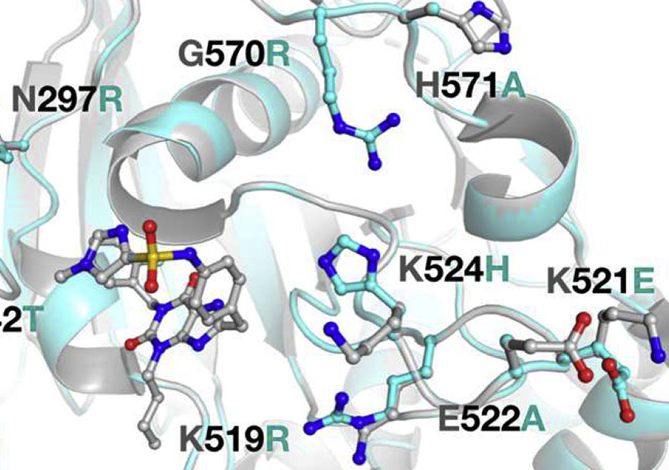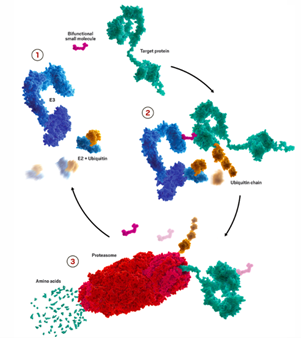In the field of cancer therapeutics, we are working in three multidisciplinary projects in collaboration with excellent professionals.
Increasing the arsenal of molecules for Glioblastoma.
Glioblastoma multiforme (GBM) is a lethal brain tumor with no cure or effective treatment thus, an unmet medical need. GBM treatment consist of surgical resection followed by chemoradiotherapy, with an average survival rate of just 12 to 15 months. Temozolomide is the only chemotherapeutic agent used worldwide. Unfortunately, more than 50% of temozolomide-treated patients do not show an effective response to it, mainly because acquired resistance.
We are working in the design and development of structurally new families of compounds endowed with excellent antiproliferative activity in GBM cell lines. In vivo proof-of-concept in GBM models of Drosophila melanogaster and Caenorhabditis elegans model have demonstrated the beneficial effects of selected compounds in the amelioration of the illness.
Inhibitors of Phosphoenolpyruvate Carboxykinase.
Phosphoenolpyruvate carboxykinase (PEPCK) catalyses the decarboxylation of oxaloacetate to phosphoenolpyruvate. The mitochondrial isozyme, PEPCK-M is highly expressed in cancer cells, where it plays a role in nutrient stress response. To date, pharmacological strategies to target this pathway have not been pursued.
We have reported the first validation of a PEPCK inhibitor that target PEPCK-M as cancer therapeutics. Administration of the PEPCK-M inhibitor successfully inhibited tumor growth in two murine xenograft models as compared to vehicle, without weight loss, or any sign of apparent toxicity.
This project is a collaboration with the Research group of Dr. José Carlos Perales.
Hyroššová, P.; Aragó, M.; Muñoz-Pinedo, C.; Viñals, F.; García-Rovés, P. M.; Escolano, C.; Méndez-Lucas, A.; Perales, J. C. Glycosylation defects, offset by PEPCK-M, drive entosis in breast carcinoma cells. Cell Death Dis. 2022, 13, 730. https://www.ncbi.nlm.nih.gov/pmc/articles/PMC9402552/
Aragó, M.; Moreno-Felici, J.; Abás, S.; Rodríguez-Arévalo, S.; Hyroššová, P.; Figuras, A.; Viñals, F.; Pérez, B.; Loza, M. I.; Brea, J.; Latorrre, P.; Carrodeguas, A.; García-Rovés, P. M.; Galdeano, C.; Ginex, T.; Luque, F. J.; Escolano, C.; Perales, J. C. Pharmacology and preclinical validation of a novel anticancer compound targeting PEPCK-M. Biomedicine & Pharmacotherapy 2020, 121, 109601. Pharmacology and preclinical validation of a novel anticancer compound targeting PEPCK-M – ScienceDirect
Moreno-Felici, J.; Hyroššová, P.; Aragó, M.; Rodríguez-Arévalo, S.; García-Rovés, P. M.; Escolano, C.; Perales, J. C. Phosphoenolpyruvate from Glycolysis and PEPCK Regulate Cancer Cell Fate by Altering Cytosolic Ca2. Cells 2019, 19, 18. https://www.mdpi.com/2073-4409/9/1/18
Discovery of Novel BRD4 Ligand Scaffolds.
This project is a collaboration with the Research group of Drs. Xavier Barrill and Carles Galdeano (http://www.ub.edu/bl/.)
Piticchio, S. G.; Martínez-Cartró, M.; Scaffidi, S.; Rachman, M.; Rodríguez-Arévalo, S.; Sánchez-Arfelis, A.; Escolano, C.; Picaud, S.; Krojer, T.; Filippakopoulos, P.; von Delft, F.; Galdeano, C.; Barril, X. Discovery of Novel BRD4 Ligand Scaffolds by Automated Navigation of the Fragment Chemical Space. J. Med. Chem. 2021, 64, 17887–17900. https://pubmed.ncbi.nlm.nih.gov/34898210/


